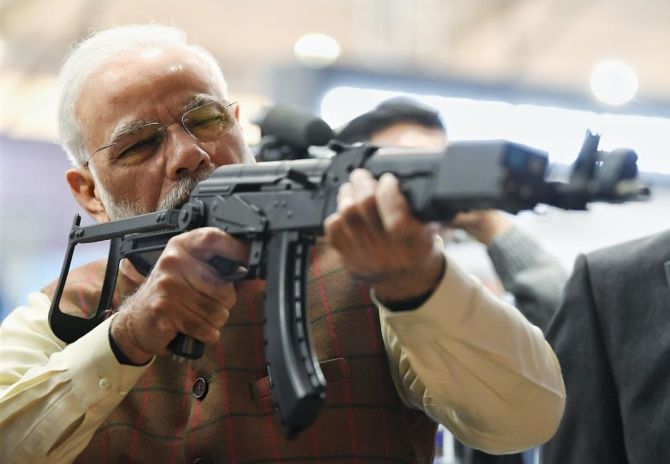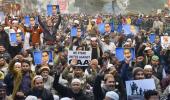'It does not look like unemployment is a priority for the government.'
'If there was one external factor which could have made an impact on low investment and low jobs, it was the Budget and it has not made any difference.'
'2020 is going to be a difficult and challenging year.'

In December 2019, India's unemployment rate rose to an alarming 7.7%, the highest in the last 45 years, according to a report released by the Centre for Monitoring Indian Economy.
Just two years earlier, in 2017, it was 3.8%!
Is there anything in Budget 2020 to address one of the most serious issues the economy faces?
"The finance minister says the youth are not looking for jobs. She categorically says today's youth is entrepreneurial, that they are not job seekers, they are job providers. This, in my opinion shows a lack of understanding, or at least a lack of appreciation, of the problem the data is showing... If you have such high unemployment rate among the youngsters of the country, it is going to show up in anger," Mahesh Vyas, CEO and managing director, CMIE, tells Rediff.com's Shobha Warrier.
Early last year we spoke about unemployment resulting in social unrest. With the unemployment rate as high as 7.5%, do you think the protests and unrest we see on campuses and many cities, as an outcome of that?
It could have played a role, for sure, in the social unrest we see around.
The unemployment rate is around 7.5% currently which is the highest in 45 years according to NSSO numbers. Therefore, unemployment might have played a role in the social unrest we see today, particularly on the campuses.
It could have played a bigger role as unemployment in young graduates is even higher.
Your report says the unemployment rate is a staggering 60% among graduates in the 20 to 29 age group.
Yes, and it is 43% among the graduates in the age group of 20 to 24, which is quite high. If you have such high unemployment rate among the youngsters of the country, it is going to show up in anger in some ways.
Though the social strife is not caused by unemployment, it has played a major role.
Are we looking at a situation similar to what happened in the 1970s when unemployment was extremely high?
Unemployment in the 1970s manifested itself into a political movement. It resulted in the Navnirman movement in Gujarat, and then to the JP movement which lead to the Emergency.
Whether the current unemployment rate will channelise into something similar politically is something that I do not have a view on.
From the way it impacted Indira Gandhi's very strong government shows that even a government with a huge majority can be rattled by unrest among the youth.
It has impacted the current government, and it had to take cognisance of this. It is fighting this in the Delhi election currently.
It has an impact on the political space and it has impacted the government, and they are trying to douse the fire. The Uttar Pradesh government is taking extremely strong and aggressive action to deal with the opposition.
So, whether it leads to anything as dramatic as an Emergency and a fallout is difficult to say.
Is there anything in the Budget that addresses the issue of unemployment?
Unfortunately, the answer is no.
There is no money on the table for employment schemes, and they are not taking unemployment seriously.
The government has reduced the allocation for MNERGA now. It has also reduced allocation for jobs and skills.
So, the two direct schemes that can impact the unemployment problem have not been given resources equal to what they had done last year.
Prime Minister Narendra Damodardas Modi came to power promising lakhs of jobs to the youth. Do you feel it is not a priority now?
It is for the government to answer whether this is a priority or not. But it does not look like the unemployment problem is a priority for the government now.
The finance minister in her speech says the youth are not looking for jobs. She categorically says today's youth is entrepreneurial, and that they are not job seekers, they are job providers.
This, in my opinion shows a lack of understanding, or at least a lack of appreciation, of the problem the data is showing.
Do you think the government is in denial about unemployment?
Yes, it is a clear denial of the problem of unemployment.
With unemployment rate at 7.8%, are we in a crisis right now?
It depends on what we define as a crisis. India is so large that there are some people who will always be very happy.
For example, the urban upper middle class will not be impacted by these things. It is the lower middle classes and the less privileged people who get impacted.
And for them, I believe it has been a crisis for many years now.
We see the stock market going up. We see private equity deals happening, and people becoming Unicorn.
I think inequality is increasing big time, and that is a silent crisis underway.
Because of globalisation?
No, it is not because of globalisation. It is our own making.
It is entirely our own making that we have not paid attention to the requirements of the underprivileged.
We have seen people who get rich on the basis of riches and is causing inequality. For example, when the rich gets tax benefits, the wage earners do not get tax benefits.
There is a conflict between people with capital and people with wage labour. So, there is an inequity arising through our own doing, in terms of giving preference to capital earners as against wage labour providers.
Do you think the MSME sector getting affected the maximum by demonetisation is one of the main reasons for the high unemployment rate?
It has impacted what is called the labour participation rate. A bigger problem than the unemployment rate is the labour participation rate.
For example, you had to shut shop after demonetisation and you are middle aged. Or, you are a worker in a shop. What are you going to do? You look for a job for some time and when you find none, you lose hope, and quit the labour market.
What happened after demonetisation and GST was a lot of women who were working in the labour market just exited the labour market.
So, the labour participation rate particularly amongst women, fell.
This is a very silent crisis of a fall in the labour participation rate in India.
A gender inequality is happening?
Yes, there is gender inequality, and there is a fall in the labour participation.
People are not even looking for jobs. Only when people come to look for jobs and do not find jobs, it will be shown as unemployment. But when people do not even look for jobs...
What do they do? Try to start something of their own?
No, they sit at home. That's what happened to women. They sat at home. Women exited the labour market.
 The youngsters who are going into the labour market at the age of 20, 22 and 24, have also exited the labour market to either study or do something at home. They are postponing coming to the labour market because there are no jobs.
The youngsters who are going into the labour market at the age of 20, 22 and 24, have also exited the labour market to either study or do something at home. They are postponing coming to the labour market because there are no jobs.
The CMIE report says while the unemployment rate among urban youth is 9%, it is 6.8% among rural youth. Were you surprised by this?
This is not surprising at all. This has been a fact of India from the beginning. Right from the 1950s, the unemployment rate in rural India is always low.
That is because when you are in rural India, you could be doing some work in your farm. When he goes back to his village, he helps his father or uncle as there is some work on the farm.
It may not be a fruitful activity, but he does some work.
On the other hand, the urban youth has no such option. He cannot go to somebody else's shop and work. So, he sits at home.
Rural India gives the youth disguised employment while urban India gives less disguised employment.
Should the government not be worried about the 9% unemployment rate among urban youth?
It should be very worrisome! At least it worries me!
I think the government is giving less attention to the economy than the economy deserves.
So, the goal of a $5 trillion economy is very far away?
It is one thing to make an attractive statement like making India a $5 trillion economy. If you had not done any damage to the economy, the economy could have grown enough to be $5 trillion.
But what we have done is damage the economy. Therefore, it is becoming increasingly difficult to reach $5 trillion.
It is important to ensure that we don't cause damage to the economy.
By damage, do you mean demonetisation and bad implementation of GST?
That is the biggest problem. But even now, not giving resources in the central Budget to MNERGA and job development schemes, for example is a problem.
And diverting attention to other social and nationalistic issues become very highly divisive and they are digressions.
Are digressions not transient? Won't the reality strike people one day?
I am surprised that we have not reached that point already.
After the problems of demonetisation and GST, and now the social strife coming up all over the country, I thought we had reached a point where it was necessary for the government to take cognisance of the problem and pay greater attention the economy.
But the recent Budget denies such hope.
Last year, when we spoke, you had said India was not producing enough good quality jobs. Would you say now, India is producing no jobs at all?
I would say, we are producing worse quality jobs!
We used to produce jobs for engineers and doctors in the 1960s and 1970s and the 1980s. In the 1990s, we produced more jobs for the sales people, then more jobs for the BPOs and KPOs and IT engineers which was not bad, but the jobs in the call centres and BPOs were poor quality jobs.
Now, we have moved down to delivery boys in the retail sector.
That is the biggest growth in the job scene. But we have exhausted even that.
In between, we created some construction jobs, but even that have gone.
Now, the only jobs we are creating are jobs in agriculture which is the worst kind of job.
This is the big fall in the quality of jobs from the 1960s, 1970s and the 1980s to today.
The other day, Natarajan Chandrasekharan, chairman, Tata Sons, said we could create 70 to 100 million jobs in the formal sector if we could formalise the informal sector where a majority of the jobs are right now. He said it was possible if we put our minds to it.
It would be a wonderful thing if any enterprise were to do that.
For example, if I have a job as a delivery boy which is not a formal job and not done on a formal contract, I may not have job security, I may not have provident fund services, ESI services, etc.
If all companies can formalise these kinds of jobs and they are ready to engage everyone they hire formally with all the benefits, it will be great.
I would take it even further and say that all the drivers and the maids who work at home should be given these facilities.
I would further say that formalisation is the only way jobs should be provided.
It will change the employment scene, and the quality of jobs leading to better lives in a very big way.
What do you foresee for 2020?
I see 2020 to be a challenging year.
The Budget has disappointed. Therefore, I don't see investments picking up. Therefore, I don't see jobs coming up.
If there was one external factor which could have made an impact on low investment and low jobs, it was the Budget and it has not made any difference.
Therefore, investments are going to remain low and jobs are also going to remain low.
So, 2020 is going to be a difficult and challenging year.










